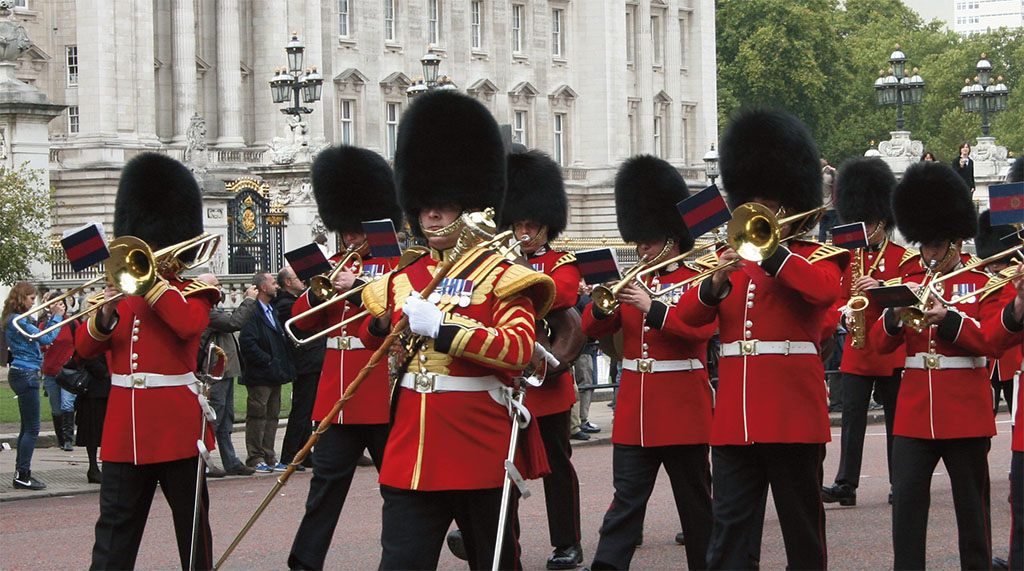
[caption id="BritainintheMiddle_img1" align="aligncenter" width="231"]

[caption id="BritainintheMiddle_img2" align="aligncenter" width="1024"]

DANA HUNTLEY
THESE ARE HEADY DAYS in the United Kingdom. Great Britain may discover in the coming months that it really has come to the proverbial fork in the road. Does it want to “go it alone,” as it were, or go-along-to-get-along and cede ever more of its independence to a federated Europe?
In one form or another, the topic has dominated the discourse in the British marketplace throughout the autumn and winter. Either way, to most informed opinion, the future looks less than rosy. If Britain continues to balk at European financial integration (let alone decides to withdraw elements of its own sovereignty), it faces a huge economic backlash from what is, in aggregate, its largest trading partner. If it follows the lead of France and Germany, Britain embroils its national interests and financial future in a very shaky destiny over which it has little control.
The Coalition that is the British Government is a little schizophrenic. The very junior Liberal Democrats are the most pro-European of Britain’s political voices. The Conservatives may not be the most vocal Eurosceptics, but they’re the ones that count. The more marginal UKIP party is essentially anti-EU, but not a major player politically. PM David Cameron is trying to hold together the Coalition; his preoccupation is “real politik” and largely defensive. Cameron should not be confused with the small-government Conservative as Americans think of it; the British frame of reference is different. After all, even Margaret Thatcher championed the NHS.
In November, 80 Conservative MPs ignored a stern party whip and voted for a national referendum to be held on the question of the European Union. Though the party has nominally championed such a referendum for years, in power but tenuously, Cameron could not risk such an official national voice. Simply put, the British would vote to withdraw from the EU, or to withhold from the EU such powers and independence as was put to them for a vote.
This is not a new tension for Great Britain. For two generations now, the British have argued and anguished over how to preserve Britain’s national identity and divide its loyalties. Its political values and cultural kinship lie with the transatlantic alliance—the “special relationship” with the United States that will always be there, like it or not. Its social values, however, and its economic fate have evolved far more in concert with its post–World War II European neighbors.
In between, British nationalism is strong, particularly in England. For a country that has made such contributions to Western civilization and has such a strong history of dominance across the seven seas, it’s not a pleasant adjustment of the national psyche to be in the umbra of either the United States or a Franco-German alliance. But it is Europe right now that has slowly but steadily drained its sovereignty and its independence.
Brussels has dictated agricultural policy, fiddled with the UK domestic market (weights and measures, for instance), opened their borders, imposed itself on the British justice system and cost them far more than they have ever gained. Besides, they just have never trusted the French and Germans. By and large, the English have simply had enough.
The picture looks a little different in Scotland and Wales. Both countries have their own struggle for identity going on. In Wales, the Welsh nationalist movement and Plaid Cymru may represent more romantic longing than political juggernaut. The Scottish independence movement, represented by the SNP (the parliamentary majority), however, has real legs. An independent Scotland might suffer economically from a lack of income distribution in the UK, but would seek a full place and voice in the EU that would more than compensate the Scots.
What to do. What to do.
The problem with European finances isn’t going to go away. The long-term economic picture is bleak. The problem is systemic, and demographic. In a nutshell, the nations of Europe have built huge public sectors and created enormous commitments to social welfare, public infrastructure and benefit programs of all kinds. Now, their economies are just not strong enough to pay for them. They have decades of declining birthrates and aging populations. That means fewer and fewer people in the productive economy paying for more and more social benefits and public sector employees. There comes a point when that just doesn’t work. They’ve reached that point. While the problem isn’t dissimilar to what we face on this side of the pond, the trajectory has been far worse in Britain and the Continent.
Let’s give credit where credit is due; Britain has recognized the severity of the problem, and through its much-discussed fiscal austerity program, attempted to address the systemic imbalance in national finances. They are still talking about it, of course—sometimes loudly.
Elsewhere in Europe, in Greece and other Mediterranean countries, for instance, public resistance to the medicine has been disruptive and virulent. Of course, they are tied together in the “Euro-zone” to Germany, France, etc. To resolve the immediate crisis in the Euro-using countries, Britain has been asked to pony up billions to help, while their own domestic life is still reeling from serious cuts to education, health care, emergency services and so forth. It’ll take a lot of tea to wash that cake down in Britain.
[caption id="BritainintheMiddle_img3" align="aligncenter" width="873"]

©TRUSTEES OF THE BRITISH MUSEUM
This summer we saw the kind of turn that civil unrest can take in English cities. But how does all this economic austerity and political uncertainty play in the shires? Now it’s time for the good news: Life goes on. The British are nothing if not a resilient people. They have had plenty of opportunity over the last 800 years or so to demonstrate that. They have survived everything from the Great Plague and the traumas of the English Reformation to World War I and the Battle of Britain. That famous collective stiff upper lip has been well earned. “Musn’t grumble,” after all.
While the mavens of Westminster wrestle politically, folks are more immediately engaged with the ways that contemporary realities are impacting the rhythms of daily life: the boarded-up shop fronts on the High Street, the steady disappearance of village pubs, the closure of rural post offices, antisocial behaviors of sundry sorts and the high cost of petrol. Oh, people are grumbling all right.
Despite the doom and gloom of the moment, however, an end-of-year Euro-pean-wide poll found that Brits were a happier people than most Europeans—including the French and Germans. And why not? They’ve seen it all before. Jane Austen wrote all her delightful novels against the backdrop of the Napoleonic Wars and never mentioned anything except gallant officers enjoying themselves on the home front. It’s a matter of focusing on what is timeless and important, like “Will there be honey still for tea?”
Since you asked.





Comments